





| Imprint | Contact | Home |
![]()
| |
|
|
|
|
In 1925 Askin began seriously considering acting as a profession. He
auditioned with a well known actor in the "Josefstadt", Herman Rhomberg.
Rhomberg gave him a recommendation to the director of the state academy
of performing arts.
His and his family`s financial situation was so poor that he was unable to attend
the state academy.
His father suggested he attend an evening class at the
People's Academy where a famous actor of the time - Hans Thimig - taught acting
and Hans Kirchner gave lessons in speech. In addition he took part in
the quire for poems or monologues under the direction of Hans Thimig.
Hans Thimig believed in Askin as an actor with talent and he gave him
private lessons.
On the 25th of May 1926 Leon Askin stood on a professional stage for
the first time. It was a small theater in the Riemergasse in Vienna, named
"Panspiele". The play was Rolf Lauckner´s "Schrei aus der
Strasse". Most of the performing actors were already professionals.
Max Mell´s "Apostelspiel" and Lion Feuchtwanger´s "Der
holländische Kaufmann" followed. Strangely enough - the play
"Der holländische Kaufmann" was performed nowhere else
than in this little theater in Vienna and Lion Feuchtwanger - the famous
actor - never saw his play performed on stage.
1927 Leon Askin became a member of the "New School for Dramatic
Education", an organization, which was associated with the actors
of the "Theater of the Josefstadt" under the guidance of Max
Reinhardt. One year later Max Reinhardt took complete charge of this new
school and gave it a new name "Das Max Reinhardt Seminar". 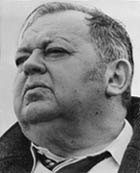 Leon Askin was
born in Vienna/Austria as Leo Aschkenasy on the 18th of September 1907. In his
own words:
Leon Askin was
born in Vienna/Austria as Leo Aschkenasy on the 18th of September 1907. In his
own words:
"I am a Viennese by birth and I was born on the highest
and holiest Jewish Day YOM KIPPUR. My father was an ardent socialist for
many years. The interest of my mother was more in the entertainment field.
She loved to go to concerts and to the theatre. These different interests
- art and politics - more or less governed my childhood. The later years
in my youth were influenced by the political change in Austria from the
Austrian-Hungarian Monarchy to the first republic of Austria. Especially
for my father it was a great change. He used to be a socialist and even
a member of the socialist party. But then he became an orthodox Jew. In
addition I could feel the growing Anti-Semitism in school as well as among
my friends and comrades."
"From that moment on I knew my profession in life was
and has remained until today an actor's life."
In January 1928 the general director of
the "City Stages" in Düsseldorf, Walter Bruno Iltz, came
to Vienna. Askin gave an audition and Iltz hired him to become an actor
for a full year in Düsseldorf. He played many interesting roles during
this year.
Among these were the part of Legrende in Georg Büchner´s "Dantons
Tod" and the part of Lancaster in Berthold
Brecht´s and Lion Feuchtwanger´s "Eduard II".
By the end of the season the theater in Düsseldorf was taken over
in toto by the famous Louise "Dumont Playhouse". From that day
on until the National Socialists took over the theaters all over Germany,
Leon Askin became a "Dumont actor". The "Louise Dumont
Playhouse" was known all over Germany. It was one of the most famous
theaters in Germany. It also had a reputation as a theater specialized
in putting plays by Ibsen on stage. Louise Dumont was the true protagonist
of the so called "Spiritual Theatre"-period. Louise Dumont was
the director of the theater. But the one who managed the daily repertoire
was Louise Dumont´s husband Gustav Lindemann. He also directed many productions
while Louise only came to the last rehearsals to give a final touch to
the production.
The engagement as an actor and assistant director in the Dumont Playhouse
was a very active and eventful time. Among several interesting parts Askin
performed as Flinch in Berthold Brecht´s "Three Penny Opera", Aljoscha
in Maxim Gorki´s "Nachtasyl" and Dreyfuss in Hans Rehfisch´s
"Die Affaire Dreyfuss".
After the death of Louise Dumont
in May 1932 the Dumont Playhouse again came under the guidance of the
"City Stages" of Düsseldorf. There - under the direction
of Leopold Lindtberg - Leon Askin played Borachio in Shakespeare's "Much
to do about nothing" and the Baron of Wernthal in "Scherz, Satire
Ironie und tiefere Bedeutung". His principal success was the Clerk
Pfeiffer in Gerhard Hauptmann´s "Die Weber", a rather unpleasant
person. But the great Gerhard Hauptmann loved his performance. At last
he played Spiegelberg in Friedrich Schiller´s "Die Räuber" under
the direction of Leopold Lindtberg. Lindtberg came from Berlin and had
made his name as a director and assistant of Erwin Piscator.
On March 11th 1933 Leon Askin was thrown out of the theater as a Jew,
on April 15th 1933 he was arrested by the SA on the famous Düsseldorf
street named Königsallee, taken away to SA-barracks and beat by a
member of the SS. "It was one of the great chances in my life to become
a Dumont actor. To be a Dumont actor was considered to be a great honor
for an actor, yet it also had its disadvantages. A Dumont actor was considered
to be too stilted - the way we Dumont actors used to speak. It therefor
was not easy to get any other engagement in another theater. Directors
and producers were afraid of a Dumont actor while at the same time they
admired him. Louise demanded perfection. Her kind of performing gave the
theater the reputation that it had throughout the world - even in Paris.
Louise Dumont - born in Cologne - was a strict catholic, Gustav Lindemann
a Jew. My admiration for these two people was great and has remained alive
in my thoughts to this very day. My connection to Gustav Lindemann was
not one-sided. I regularly received letters from Lindemann until he died
a couple of years ago."
"Here I could start singing 'How small is the world'.
I started acting in Düsseldorf under the direction of Lindtberg,
an associate of Erwin Piscator. Later in life I became Piscator´s assistant
director, his assistant and his secretary. Not enough I became a servant
of two masters, assistant and secretary of Erwin and his wife Maria Piscator."
1935 Askin went for a short time back to Vienna where he started a new
project named "ABC", also a political cabaret. Artists such as Jura
Soyfer, Hans Weigel, Jimmy Berg and Fritz Eckhart became part of this
new cabaret.
Askin was happy working in Vienna, but the happiness was short lived.
1938 was near and he had to flee his motherland
again. Where did he go? To Paris naturally, where he had been once before.
The famous journalist Berta Zuckerkandl gave him a recommendation to
a famous Viennese, the beautiful Maria Ley. Maria Ley was known to help
refugees, besides she was married to the world famous director Erwin
Piscator. Erwin Piscator hired Askin as his secretary and assistant
director. However Askin felt that he had become a servant of two masters.
He worked for Erwin but he also worked for Maria. Soon world War II started and Askin was put in a internment camp in
Meslay du Maine.
Finally in December they were transferred into barracks. There they
had light, a little stove and some enterprising internee came every morning
and brought them fresh rolls, because he had connections with the baker
in a nearly village. The greatest problem was water. They only received
two glasses of water per day for washing and drinking.
We also cooked some coffee ourselves, but we had no spoons, so we
used big nails. One day I received notice that my emigration was accepted
and I could leave for America with the next transport. When I said 'Goodbye'
to Capitain Bertrand he said to me: 'I thought you love France, why
are you quitting it now?' My answer was short and brief: 'Yes, mon Capitain,
I loved France but did France love me ?' He understood, stretched his
hand out and said: 'Bonne chance, mon ami !' The goodbye from the international
camp in Meslay du Maine was very sad.
There were the few friends who stretched their hands towards me to
say goodbye, others gave little pieces of paper with addresses of their
friends in the United States to me. As I stepped on the truck that took
me away, everyone cried, screamed goodbye and until this very day in
my ear remains the cry of Meslay du Maine. It was the 12th February
- the wedding day of my parents - I stood at the reeling of the 'SS
De Grasse', looked into the dark night, thinking 'Will I ever see my
parents again, will I ever see Europe again ?', then slowly the land
of Europe disappeared in the night." On February the 29th, 1940 Leon Askin arrived in New York. The first
few months in America were not easy for Leon Askin, they brought him quite
often in a condition of total depression. He had no real activity that
you may call, especially by American standards, a job.
The first production that he directed was Irving Shaw's "The Gentle
People". It was an immediate success. The only sad matter in this
whole affair was his break with Piscator. Nevertheless he visited Piscator
in his summerhome on Long Island to clear the situation between the Piscator's
and himself. The success of that mission was half and half, they began
a correspondence and the success of his productions of "The Gentle
People", "Man in White" and "The American Way"
astonished Piscator so much that he felt they should start working together
again. Askins greatest success as a director was G.B. Shaw's "The Applecart".
In Europe "The Applecart" is known through Max Reinhardt's success
"Der Kaiser von Amerika". It's a fascinating play, but a talky
one. And one critic wrote: "Askin's direction of "The Applecart"
beats Shaw in his own game."
It was the fall of 1941 and the opening night of his next production,
Shakespeare´s 'Troilus and Cressida' was near.
The Civic Theatre closed its doors and Leon Askin became a soldier in
the American Army.
During his time of service, Leon Askin became a citizen of the USA.
At the same time he changed his name from Leon Aschkenasy to Leon Askin.
Nevertheless the head of the American Air Force, General Arnold, ordered
him out of the United States to overseas duty in England. He could keep
his rank as Tech's Sergeant Leon Askin 334727.
Before leaving Europe Askin asked his commanding officer for permission
to fly to Paris for three days. He wanted to contact the Red Cross to
look for relatives who may have survived the death camps of NAZI Germany.
Back in New York after the war Leon Askin started a theater group with
actors who served in the US army. The name of this group was VMS (Veterans
Memorial Stage). The group elected him to be their president. The first production he directed on the Broadway was Goethe's "Faust"
in 1947, in which the great Albert Bassermann played Mephisto and Askin
played the title-part Faust. To everyone's astonishment it was a huge
success. The second production was the "Merchant of Venice".
These two productions were attended mostly by European emigrants and brought
the German theater in New York to the attention of the German speaking
public in New York.
During this period Leon Askin became also member of the executive board
in the Equity Library Theatre, an organisation founded by the American
Actors Equity. Leon Askin is a founding member of the AAE. In 1950 Leon
Askin received an offer by Jose Ferrer to play in his production "20th
Century", a comedy ba Ben Hecht and Charles Mc Arthur. He played
the part of Judas for over a year. 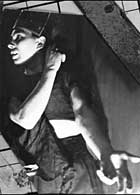 One
day after his release from the police prison, Askin left Germany for Paris.
He should spend approximately 5 years in Paris. He started a political cabaret
with other emigrated artists. The cabaret was called "Künstlerclub
Paris-Vienne" and was very successful.
One
day after his release from the police prison, Askin left Germany for Paris.
He should spend approximately 5 years in Paris. He started a political cabaret
with other emigrated artists. The cabaret was called "Künstlerclub
Paris-Vienne" and was very successful.
"We wanted to bring the political situation in Austria
on stage. Naturally we could not do that without pointing to Austrian's
northern neighbor Germany. In the years 1933 to 1938 fascist social systems
became more and more presentable. With our artistic means we wanted to
point out the dangers that Austria was exposed to in the embrace of Hitler,
Mussolini and Horthy."
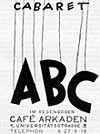 In
1935 Askins activities as art director of "ABC" were interrupted
to become stage manager and actor at the State Theater of Upper Austria
in Linz for 6 months. Especially his production of Emmet Lavey´s "The
First Legion", a Jesuite drama, was a big success. He also played one
of the main parts in this production. Otto
Ludwig Preminger, director of Josefstadt Theatre by that time, asked
Askin to play the same part in Vienna´s production of "The First
Legion".
In
1935 Askins activities as art director of "ABC" were interrupted
to become stage manager and actor at the State Theater of Upper Austria
in Linz for 6 months. Especially his production of Emmet Lavey´s "The
First Legion", a Jesuite drama, was a big success. He also played one
of the main parts in this production. Otto
Ludwig Preminger, director of Josefstadt Theatre by that time, asked
Askin to play the same part in Vienna´s production of "The First
Legion".
Maria at that time had the idea to write a play. So Askin worked with
her on her play and did also secretarial work such as collecting the rent
for the various houses in Paris owned by Maria. By the end of the year
1938 Maria and Erwin left Paris for the United States. Askin was left
behind to do the Piscators work in Paris and later to follow him to New
York. Piscator started his famous school of drama "The dramatic workshop".
"During the first few months Mesley du Maine was a nightmare.
We slept in the open air, sometimes it rained, we tried to cover ourselves
with some old tents and in the evening we walked through thick mud to
one of the dry tents where we made cabaret. One opera singer sang arias,
but this whole period in the mud was pretty much of a nightmare."
"In the morning we received some very thin coffee. For
lunch we had potato soup with a few pieces of meat in it, in the evening
we had a very thin meat soup with some potatoes in it. But we were very
enterprising. Out of old cans we made a shower and so we were very modern.
When we stepped out of the douche we stepped out on a piece of wood so
we had some comfort. Captain Bertrand, the commander of the camp, let
us build a little theater and he boroughed from the nearby village some
musical instruments, so we started an orchestra.
"I went to dinner or to lunch with the Piscators, but
when the Piscators left New York for a few days and sometimes not willingly
but just simply forgot to leave me some money, it happend that I was in
the middle of New York City without a penny. I did not know what my future
in America will be. I had no prospects for a job or what to do, my English
was very poor."
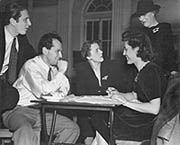 In the fall of 1940 Piscator
gave him the first true opportunity: He gave him the temporary position
of the managing director of the "Civic Theatre" in Washington
D.C., furthermore the direction of a kind of political revue "D.C.
Melody". "D.C. Melody" was a colossal flop and Piscator
left Washington D.C. . The members of the Civic Theatre elected Leon Askin
as their managing director.
In the fall of 1940 Piscator
gave him the first true opportunity: He gave him the temporary position
of the managing director of the "Civic Theatre" in Washington
D.C., furthermore the direction of a kind of political revue "D.C.
Melody". "D.C. Melody" was a colossal flop and Piscator
left Washington D.C. . The members of the Civic Theatre elected Leon Askin
as their managing director.
"'Troilus and Cressida' is the one and only antiwarplay
that Shakespeare wrote. Unfortunately I put the opening date on the 5th
of December 1941 and on the 7th of December the Japanese bombarded Pearl
Harbour. My dream of a theater in Washington D.C. came to a prompt end.
The antiwarplay 'Troilus and Cressida' had to give way to the beginning
of World War II."
"I was put in the Air Corps. I was never educated to serve
in the military, but soon my activities in the American Air Corps became
very interesting to me. 1944 I was put in charge to write a weekly digest,
'The Orientation Digest', which became one of the most outstanding military
publications. It provided important information about the situation in
Europe for the soldiers who were sent overseas."
 Askin received great praise from the War
Ministery for his work. On account of the many praises he was also put
in the charge to give lectures to the enlisted men.
Askin received great praise from the War
Ministery for his work. On account of the many praises he was also put
in the charge to give lectures to the enlisted men.
"Perhaps I was a bit to courageous, one could also say
a bit too impertinent. I wrote an editorial in which I attacked Sweden.
A totally neutral state as not being so neutral because it delivered the
little match-sticks to Germany."
"Naturally the transfer to England was only an adventure
for me. I was put into a little village called Gatsby and was the main
source of information to the 'Enlisted Men'. It was a 'very difficult'
job. I was driven by enlisted men from camp to camp to inspect their activities
of information and education. That was from Monday to Friday. Friday afternoon
I took advantage of my Tech's Sergeant position and went with the fastest
train from Leicester, where I was stationed, to London, every weekend,
naturally first class. Sometimes I went to Scotland or to other fine places
in England."
"With hope and anxiety I went to the place where there
was such a list, where I could find out places and time what happened
to my poor parents. But all I could find out was that both my mother and
my father were deported to the death camp of Theresienstadt on the 22nd
of July 1942. I also was told that further places where my parents were
transported to was the infamous Auschwitz and later Lublin where they
were burned to death."
He now began to seek work as a director on a Broadway stage and also as
a drama teacher. He gave many lectures on the subject of modern American
theater and drama in comparison to the European theater and drama.
"The part of the brother of Margret Valentin played an
English german-speaking actor named Anton Differing. Differing was an
excellent actor yet even excellent actors can make a mistake sometimes.
Such a mistake happened to Differing at the dress rehearsals. The lines
in Goethe's Faust are the following: 'Und nun ums Haar sich auszuraufen
und auf die Wände hinaufzulaufen...'. He changed mistakenly to 'ums
Haar sich auszureissen und auf die Wände hinaufzu...', great laughter
in the audience."
In February 1952 Leon Askin received his
first offer by Max Arnow, scout of Columbia Pictures. His first film role
was a part in the production "Assignment Paris".
As she was told that 'The Girl with the Match Sticks' was written
by the Grimm brothers, she laughed and said, 'I'm a Swede, I should
know, and Askin was right!' At this moment Harry Kohn, the executive
producer of Columbia Pictures came in and as he found out that I was
right he thanked me that I saved Columbia pictures so much money, because
they would have had to redo the entire scene, which by now was no longer
necessary and I received many pats on the shoulders for saving Columbia
lots of money. Such was my entrance into the family of Hollywood actors."
1961 Billy Wilder hired Leon
Askin to play in his successful movie "1,2,3".
During his time in Hollywood Leon Askin worked with many big stars,
like Doris Day, Audrey Totter, Danny Kaye, Gloria Swanson, Peter Ustinov,
Jean Simmons and others.
As for working together with big stars Leon Askin thinks the bigger
the stars the easier was the work. In the film "Do not disturb",
Doris Day Doris and him became friends.
"It was very interesting, but I quickly had a dispute
with the director and the producer. The director claimed that the fairy
tale 'The Girl with the Match Sticks' was written by the Grimm brothers.
I told the director and producer that the author was H.C. Andersen, yet
they didn't believe me. I again took all my courage and told the producer
that he was wrong. He said that he could not believe me and could well
understand that I wish to make a good impression on my first day in a
film studio. The producer got angry with me. At this very moment the Swedish
actress, Martha Thoren, entered the room and was astonished that there
was such a violent dispute.
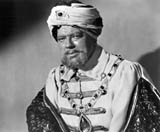 And so
Askin became a Hollywood actor and he remained a Hollywood actor until
August 1993. He appeared in more than 60 Hollywood pictures. Sometimes
in big roles, sometimes in small ones. However he remained an accent actor.
He spoke English well but he never achieved the pure royal English as
spoken in Buckingham palace.
And so
Askin became a Hollywood actor and he remained a Hollywood actor until
August 1993. He appeared in more than 60 Hollywood pictures. Sometimes
in big roles, sometimes in small ones. However he remained an accent actor.
He spoke English well but he never achieved the pure royal English as
spoken in Buckingham palace.
"That is why I was known among my colleges and to my producers
as an accent actor and I was condemned, if one could say so, to wait for
roles where a Russian, French, Arabian, Rumanian or Chinese accent is
expected, but no American. I never became a superstar, yet in the TV series
'Hogan's Heroes' I played the starring part of General Burghalter. I also
played a very important part in the first Cinemascope film 'The Robe'
with Richard Burton. I had the great chance to play in this film. I played
the traitor Abidor and I also was in the 'Virgin Shot', the very first
scene, of this important first Cinemascope film."
"And what did I play? The Russian commissar Peripetschikof.
It was more than a pleasure to work with Billy Wilder. He gave me one
of the greatest compliments. In the morning, when I arrived on the se,t
Billy announced openly: 'Here comes my profi!' What greater compliment
could an actor get? The film '1,2,3' was unfortunately bewitched not only
with accidents but also with political events. We began shooting the film
in East Berlin and on the first shooting day August 13 the infamous wall
was erected between East and West Germany. The result was that Billy was
forced to build a new Brandenburg gate in the film studios of Munich where
we finished shooting. Another unhappy event interrupted our production,
when Horst Buchholz had a car accident which kept him from shooting for
over two months. Nevertheless '1,2,3' became a great success, not in the
beginning but about a year later. It was a beautiful film and I was proud
to be in it. My co-stars were among others Lieselotte Pulver and James
Cagney."
"It's interesting to work with great stars and it's the
easiest work because these big stars work most professionally. I remember
an incident with Virginia Mayo; it was the end of the day and Virginia
had gone home, Mr. Lubin, our director, believed so. The first assistant
looked franticly for Virginia because she had one more scene together
with me. My close-ups had to be made and she should give me the key-words.
As we finally found her she said, "I am finished for today, Leon
can play the counter part of which I am not in the picture". Lubin's
answer was typical for the professionalism of Hollywood. He said to Virginia:
'You have another scene with Leon.' Virginia said: 'The assistant director
can play that scene because I'm not in the picture.' 'Oh', said Lubin,'have
you asked Leon if he will permit that?' Virginia with a deep red face
came to me and said: 'Will you do it for me?' I looked at her laughingly
and said: 'Get the hell out of here!' "
"In the morning when she arrived she did not say to me:
"Good morning, Leon!" but in a formal French: 'Bon jour, mon
ami!'. Elizabeth Taylor, one of the most beautiful women in the world
and one of the most elegant ones asked her colleges quite often during
shooting time: 'Would you care for a glass of wine or whisky?' She was
easy to work with. An actor with whom I became great friends and was such
a pleasure to work with is Peter Ustinov - he became such a friend.
Another example how easy it was to work with great stars was Allan Ladd.
One evening, after a day of shooting had come to an end, I waited in brooding
heat for the company car to bring me back to the quarters. It was an extremely
hot day in the desert, about 113° Fahrenheit. Suddenly Allan Ladd's
car came by and he saw me and said to me: 'What the hell are you waiting
around for in that heat?' And as I answered: 'I am waiting for the company
car!', he said: 'Nuts, get into my Rolls, it is faster!' These are small
incidents, but it is important for me to say something good about Hollywood."
1955 Askin became separated from his first
wife Mimi, and after a formal divorce he married Annelies Ehrlich (Lies),
the woman he had lived with since 1952. Both decided to make a large wedding
trip. Both decided to make a large wedding trip, where they also came to
Salzburg and Vienna. There Askin received offers for a couple of motion
pictures.
Leon Askin and his wife wanted to end their journey in Hamburg. During
their stay, they were invited by Ida Ehre, the owner of the Kammerspiele.
She was in the need of an actor for Shaw's "Mrs. Warrens Profession".
Askin was hired to play the part of Sir John Croft and he was so successful
that two years later he played in Shakespeare's "Othello", the
greatest success of his life on stage.
Askin hoped to continue his career in Vienna, but was disappointed.
He returned to America.
1975 he was offered the production of Félicien Marceau´s play
'L´œuf' by the ANTA - American National Theater and Academy. It became
a big success that opened new possibilities for Askin as president of
the ANTA West. Every year one of the pleasant ones was giving out an award
for the best actor of the past year.
In the beginning of the 1980s, Leon Askin lived a rather quiet life.
During that time he wrote the book "Quietude and Quest" that
came out 1989.
Suddenly in 1985 Askin received a call from a Japanese film company
to play the lead role in "Deshima". This brought him to Japan
for 6 weeks for the first time in his life. In 1993 another director called
him to play a role in his new film "Occhio Pinocchio", which
was filmed in Brescia.
In 1994 Leon Askin returned to his birthplace
Vienna, Austria. After his first return to Vienna and to Austria in general
in 1955 the private character changed totally to a return for professional
reasons. He never had an intention to stay in Vienna for good. As he went
back to Vienna in his high age, this return was mainly for family reasons.
"1994 I played in a motion picture called 'Höhenangst',
produced by Houchang Allahyari. In the fall of 1994 Petrus Van der Let
asked me to play a film monologue, the film is called 'Hitler - mein
Krampf'. In the same year the actor and director Paulus Manker hired
me to play the lead role in a production called 'Der Vater' during the
festival weeks of Vienna. It became a sensation and Paulus continued
to hire me for three summers in a play called 'Alma'. Alma
Mahler-Werfel, the person in question, was a friend of my wife Lies,
and as a consequence, I came to know her as well. She was a very intelligent,
charming and amusing woman, quite a personality – and the best
friend my wife could ever want. The fact that we knew each other personally
is the reason that I appear in Manker’s production as a contemporary
“witness”. Alma Mahler, a great personage, was not only married
to Mahler but also to Gropius and she had a famous relationship with
Kokoschka. She had a great personality and a dressrehearsal at the Vienna
State opera could not start before Alma was in the house. Some people
in the society claimed they did not care for Alma, but they fought and
scratched to say 'Hello' to her. Alma lived in Los Angeles in Beverly
Hills, a neighbor of Bruno Walter. I had the privilege of being invited
into her home for coffee or a Manhattan, but until to her very end Alma
was a woman of a unique character. She lived one block from our home
in Beverly hills and that's where the friendship between my wife and
Alma started.
This life of Alma was dramatized by the Israeli
author Joshua Sobol for whom I played in the fascinating production
of 'Der Vater' during the Festival Weeks in Vienna.
In the year 1996 Klaus Maria Brandauer, a Burgtheater
star, hired me to play the role of Tschang in the famous operetta 'The
Land of Smiles' in the Vienna Volksoper." Leon Askin at the age of 93 lives in a home for elderly
people in the luxurious district of Döbling. He was honored by the
President of Austria to become a professional Professor, meaning he received
the title "Professor" not only as an honour but a professional
title.
“At the
end of my life, I have achieved belated fame and recognition in the
city of my birth. In 1988, I was awarded the Austrian Cross of Honor
for Science and Art; in 1994, I was presented with the Silver Cross
of Honor and, in 2002, with the Gold Cross of Honor for service to the
City of Vienna; in 1996, I was granted the honorary title of Professor
by Minister Scholten; and in 2002, I was honored with the Austrian Cross
of Honor, First Class, for Science and Art. This unexpected success
and these honors have meant more to me than belated amends; they have
prolonged my life, by giving my life new meaning and renewed security.”
In 2002, Leon Askin married the media specialist Anita
Wicher. Even at the age of
95 and counting, Leon continues to perform on stage.
"It was fascinating for me to drive with Lies through
the country roads. I also got to know Vienna again by driving through
my home town by car. I was curious to find out how the house would look
like in which I lived for so long, Sechsschimmelgasse 16. The house was
gone, for which I was glad. I was worried if I would have had to fight
with former neighbors for my personal property and books, all that was
not necessary. Sechsschimmelgasse 16 was bombed to the ground."
"I then went to Berlin, which was always the goal of every
German actor, and played in Berlin Johnson's 'Volpone' and Schnitzler's
'The Green Kakadu'. I also took part in a new film of Carl Zuckmayer's
'Schinderhannes'."
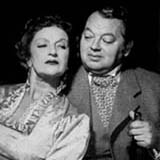 After this
brief interruption the Askins went to Munich where Leon played successfully
in Thiele's film "Lulu" with Nadja Tiller. From Munich he was
called to Vienna to play in the house he calls his Alma mater the "Theater
in the Josefstadt", Beckett´s "Waiting for Godot". His
partner was Otto Schenk.
After this
brief interruption the Askins went to Munich where Leon played successfully
in Thiele's film "Lulu" with Nadja Tiller. From Munich he was
called to Vienna to play in the house he calls his Alma mater the "Theater
in the Josefstadt", Beckett´s "Waiting for Godot". His
partner was Otto Schenk.
"For the evening of the last performance all my colleges
in the play were wearing their best clothes. Anwering my question, Otti
said: 'So a Gfries wie Dich sieht man ja nicht oft' and ever since Otti
addresses to me in letters only by 'Liebstes Gfries!' I thought my stay
in Vienna would be a short one - mistake. I suddenly stood on the stage
of the "Academy Theater" which is a side theater of the 'Burgtheater'
and I played the 'Marquis de Sade', a successful play on European stages."
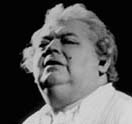
"So I spent my time giving out the 'National Artist Award'
to Helen Hayes, to Henry Fonda, to the Lunts, etc."
"In spite of the fact that my return to Vienna had family
reasons it became a tragic return through coincidences. Although my separation
from my parents was tragic I found the separation from my wife at the
age of 87 years even more painful. But I could still give people something
through my art."
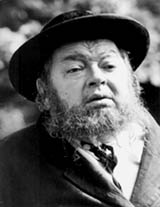 "It
is a great deal of difference to receive an honorary title or a title
in his profession. 1988 I also received from the city of Vienna the cross
of honour for art and science. These titles and the various honors mean
a great deal to me, most of all for the reason that they would mean a
great deal to my parents too. I know several Austrians and Germans who
insisted and still insist not to make any contact with their former land
of birth. Anton Kuh, a well known writer and journalist was once asked
'Where would you like to go back after the World War?' His answer is very
important. He said to the immigration officer: 'Sir, you have asked me
to which time I would like to return to my homeland. To answer that is
the most extremely difficult answer for every emigrant. A return to the
live, I lead before, is impossible.' "
"It
is a great deal of difference to receive an honorary title or a title
in his profession. 1988 I also received from the city of Vienna the cross
of honour for art and science. These titles and the various honors mean
a great deal to me, most of all for the reason that they would mean a
great deal to my parents too. I know several Austrians and Germans who
insisted and still insist not to make any contact with their former land
of birth. Anton Kuh, a well known writer and journalist was once asked
'Where would you like to go back after the World War?' His answer is very
important. He said to the immigration officer: 'Sir, you have asked me
to which time I would like to return to my homeland. To answer that is
the most extremely difficult answer for every emigrant. A return to the
live, I lead before, is impossible.' " "The journalists in Vienna and Austria and also in Germany
call me a legend. I'm a man who lived through difficult times. I'm a man
who survived the monster of all times, Adolf Hitler and I'm still, at
my high old age of 93, successful in my profession and that is the pride
with which I live and survive."